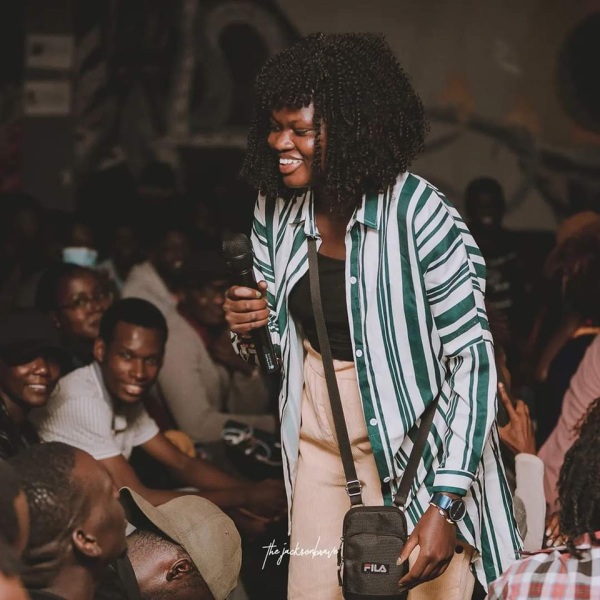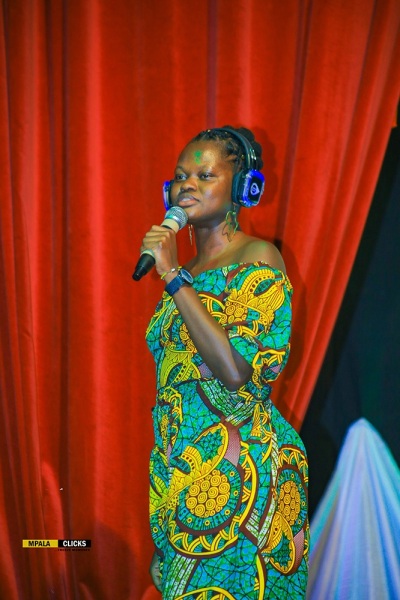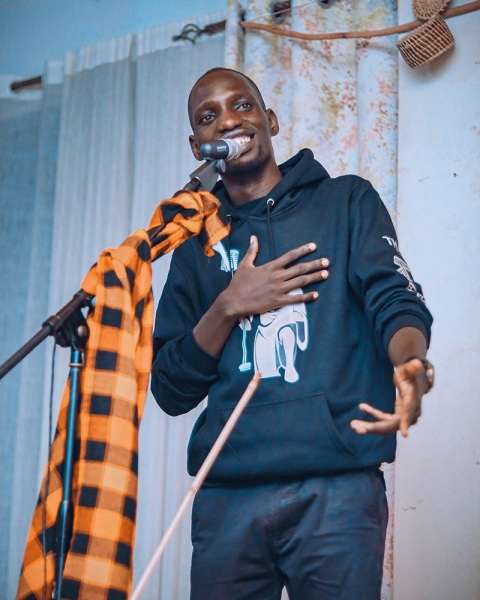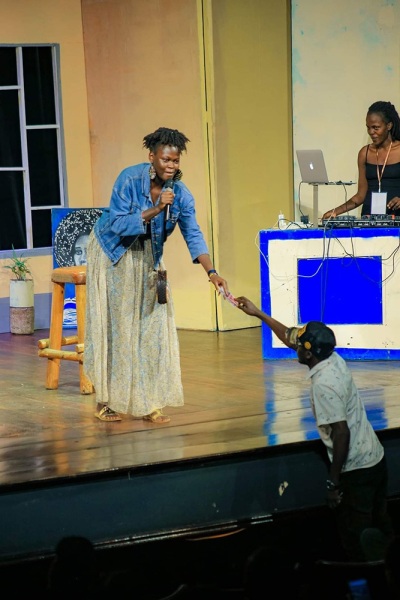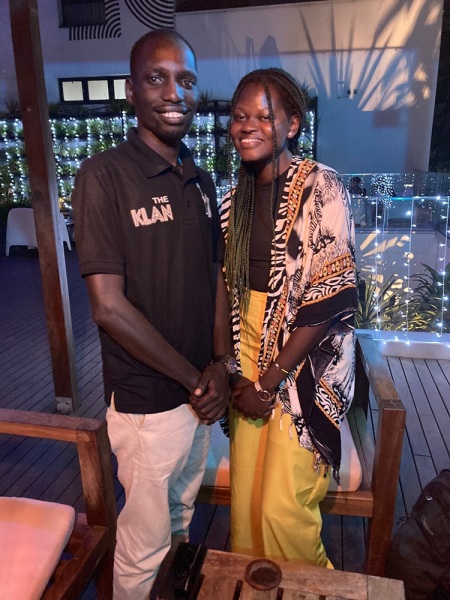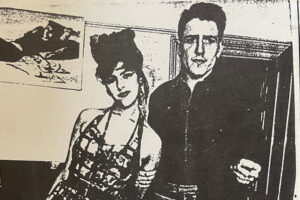Rowan Bell visits Kampala and meets Mercy Geno Apachi, performance poet, and Jordan Megolonyo, founder of the Klan poetry house
Evening comes quickly in the tropics. As dusk gathers the four of us have been discussing poetry for an hour. Jordan scrolls through his phone, but has trouble finding the poem he wants, so asks Mercy to read while he looks. In a quiet voice Mercy starts and everything becomes still and suspended as we listen. “I’m going to read ‘My Woman Begs to Be Cat-Called from the Inside’” she says. It’s easy to understand why Jordan describes her as one of the best poets in Uganda. “In a world of / Kardashians, / Fabiolas, / Natashas,” she begins. Her shoulders move in rhythm as the stanzas progress. Jordan becomes part of the poem, clicking his fingers in time and speaking words of encouragement, “come on, come on”.
Women like me
Cannot afford to lie in bed like a log
To keep a man like you,
we have to activate beast mode
soften our waists to appease your demons
Polish our “oohs” and “aahs” to please your arousal
Swallow your spills
So that what we lack in skin complexion
Is covered up by our action
Mercy’s right-hand dances as tension and passion in the poem grows. Jane, who is travelling in Uganda with me, joins in too, saying “this poem speaks to me” as Mercy reaches the final lines.
I shall carry my spirit with utmost bold
I shall let my brilliance radiate beyond the lipstick on my lips
I shall shine beyond the confines of my hips
My woman begs to be CAT-CALLED from the inside
We spontaneously applaud and, gradually returning from the reverie, smile with joy at the performance, poetic revelation and the feeling of being gathered together in a like mind.
Mercy didn’t set out in life to be a poet. After studying journalism her dream was to be a news anchor. She was interviewed for the role, but after a screen test was told her skin was too dark for the cameras
Mercy didn’t set out in life to be a poet. After studying journalism her dream was to be a news anchor. She was interviewed for the role, but after a screen test was told her skin was too dark for the cameras: “That made me angry”. She went to a spoken word event, heard poetry expressed on stage and started writing. She wanted to speak to people, share pain and say what she was going through. To speak for anyone who feels less, who feels unworthy; anger not emerging as anger, but as plain truth.
Mercy and Jordan are from Gulu in northern Uganda where violence from the Lord’s Resistance Army led by Joseph Kony created 1.7 million internal refugees and 25,000 children were captured and enslaved. The brutality is beyond horror. Kony is still at large, evading justice, probably in the vast remote lands of the Central African Republic and Southern Sudan.
Jordan trained as lawyer and is now the Legal Officer for the African Centre for Treatment and Rehabilitation of Torture Victims. His route into poetry was through listening to stories and reading from early childhood. He started to write whilst in primary school, wanting to tell his own stories. The stories emerged as songs, but he felt he couldn’t sing well enough, and when others sang his words they didn’t express the true meaning. So he became a spoken word poet.
Here are two stanzas from his poem ‘Babies’ about our inability as the human species to have all of life wrapped around our fingers, our inability to know it all, do it all, have it all despite our ever-increasing exploits in science and human development.
We are all babies
In need of feeding
Unable to rescue ourselves
We are all babies
Dirty
Unworthy
Unable to rescue ourselves
Both Jordan and Mercy were taught classical poetry at school. Jordan explains “I was taught Shakespearean poetry – sonnets about winter – I’m from northern Uganda, I know nothing about snow. I started to wonder ‘how does winter feel’ and that led to me to writing about what a place feels or tastes like, what it feels like to go through a war.”
Both Jordan and Mercy were taught classical poetry at school. Jordan explains “I was taught Shakespearean poetry – sonnets about winter – I’m from northern Uganda, I know nothing about snow
Classical poetry provided the skills and devices, but now his poetry has freedom in structure. Jordan’s poem ‘Beautiful Watches’ highlights how we have forgotten to focus on the importance of living together, but instead use superficial characteristics to create division.
Golden watches
Diamond watches
Emerald watches
Rolex watches
Plastic watches
Rubber watches
That’s what we are
And we have forgotten to tell time
English is the official national language of Uganda, adopted during the colonial period, but there are more than 70 languages in the country. Spoken poetry needs be in the language of the people listening, and puts people back in touch with their own culture. Here in the final stanza of Mercy’s poem ‘Jal we’ she moves between English and Acoli.
Jal we
Laceng caa, on Monday, you said I was the only one
Acel keken, one like this!
It has been two days Crying into the pillow
staring out the window
Only to see you pass by with Akello
Akello nya Payira, born of royalty
Akello laber mon, miss congeniality
Akello la pyere pipino, epitome of feminity!
Jal we!!
Jordan’s Acoli poem ‘Tell Me A Story’ talks about how life in the current age has changed from times past and plays on words. The character is a youth who talks to an elder and urges him to tell a story of how it used to be in the old days.
Tell Me A Story
Tell me a story
Oh tell me a proverb
Tell me where we came from
Tell me
Tell me
Narrate to me
How things happened in the golden age
Sing to me the olden songs
Serve me the olden sauce
Show me the golden age women
Show me how you wooed them
Show me how won their hearts
How you married them
Take me back to the golden age
Tell me
Tell me
But do not leave me in the archaic age
Show me what went wrong
Tell me what was crippled
Tell me how how we can uncripple it
Show me how we can show our wisdom
Using the golden age knowledge
Narrate to me
Explain the proverbs
Tell me the story
Jordan says, “I strive to use my gift / skill of poetry to change mindsets, to educate, to inform, to encourage, to build and to ultimately impact my society and communities as far as my poetry will reach. As such, I hope to work with poets and entities of different kinds that intend to better lives around the world. I believe poetry has the power to impact lives, for such is the power that words hold. One poem at a time. One life at a time.”
I believe poetry has the power to impact lives, for such is the power that words hold. One poem at a time. One life at a time
Mercy says, “Coming from Northern Uganda, a place wrecked with war, I know what it means to be bullied. We were called names –including that of the rebel leader – in people’s eyes. We were rebels whenever we tried to stand up for ourselves. We faced colourism and tribalism whenever we sought education in other parts of the country. Our physique and skin colours are still discriminated against, although I guess these are world-wide issues.
“I am a poet to remind us of humanity and equality. Whereas we speak different languages, I believe the language of poetry is open to everyone. I want a world where if we have to dislike anybody, it should be for profound reasons such as dishonesty but not for body types, tribes or wars we didn’t choose. As poets our art brings us very little money, but without adequate funding to put up shows, to visit secondary schools, poetry only remains in the alleys of the elite, educated and fellow poets. If anybody out there can support Ugandan poetry, I will be glad. I would love to see it soar on wings that give others that have no access to it, hope and meaning. Thank you.”
‘The Klan’ poetry house YouTube channel can be found here and The Klan Ug tweets at @KlanUg. The Poetry Association of Uganda website is here and on Twitter with the hashtag #WeAreThePAU. The PAU promotes poetry and spoken word through awards and an annual poetry festival. Jordan and Mercy are on Twitter @jordanmegolonyo and @GenoApachi. Mercy can be contacted by email here and Jordan here.
Mercy Geno Apachi and Jordan Megolonyo assert their intellectual property rights over the poems quoted.

